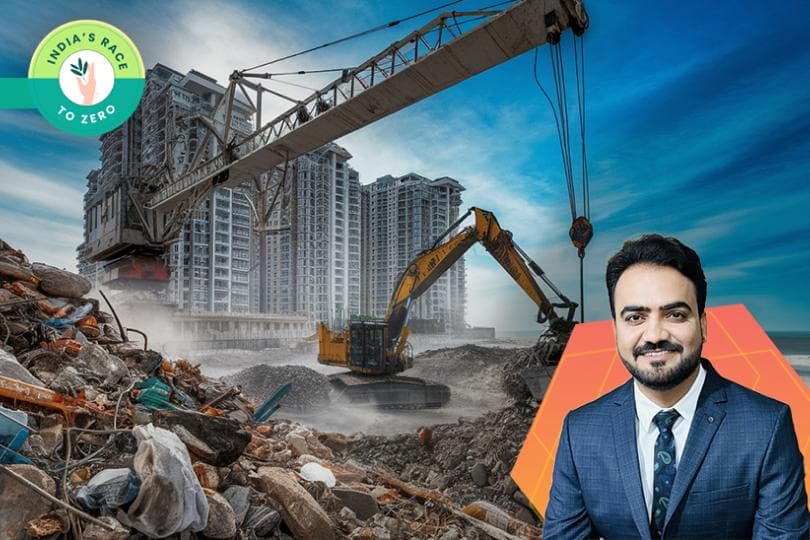Rubble to Renewal
Transforming India's Urban Landscape Through Sustainable C&D Waste Management
Shivam Sharma

Remember the demolition of the twin towers in Noida? This event not only marked a triumph of engineering prowess as these structures, taller than Delhi’s iconic Qutub Minar, were brought down in just nine seconds using the waterfall implosion technique, but it also highlighted the pressing issue of construction and demolition (C&D) waste management in urban India.
The demolition produced approximately 21,000 cubic metres of debris. Managing such a vast quantity of rubble shed light on the darker underbelly of illegal construction and the pervasive issues of corruption that had plagued the project from its inception. The task of responsibly disposing of and recycling this debris was monumental, signalling a critical juncture for sustainable urban development in India.
The scale of India's construction industry is immense, expected to reach a value of US $1.4 trillion by 2025, and with it comes an enormous generation of construction and demolition waste. Annually, India produces a staggering 150 million tonnes of such waste, yet a mere 1% is recycled sustainably. The rest finds its way to roadsides, vacant lots, and water bodies, aggravating environmental and public health challenges.
Amidst this scenario, the construction sector's toll on the environment is significant. With resource extraction rates that far exceed global averages, the strain on natural resources and air quality is palpable. The dust and particulate matter from construction sites contribute to respiratory diseases like asthma and even lung cancer. The need for effective waste management becomes not just a logistical necessity but a crucial element of public health and environmental sustainability.
Recognizing these challenges, the Indian government and various agencies have been pushing forward with initiatives and regulations. The National Clean Air Programme, aiming to cut pollution levels in over 100 cities by 2026, is just one of the many steps being taken. Moreover, the introduction of comprehensive Construction and Demolition Waste Management Rules by the Ministry of Environment, Forest, and Climate Change (MoEFCC) marks a significant policy shift towards sustainable waste management.
One exemplary initiative in tackling C&D waste was undertaken by Re Sustainability, Asia’s leading environmental management firm, following the twin towers’ demolition. Tasked with the efficient collection, recycling, and recovery of resources, the firm set up a state-of-the-art facility in Noida to process 300 tonnes of waste daily. This initiative not only showcased a proactive approach to managing C&D waste but also underscored the potential for sustainable solutions that can mitigate environmental impacts and promote circularity in the construction sector.
The way forward for India involves a multi-faceted approach that includes enhancing recycling infrastructure, fostering public and private sector partnerships, and raising awareness about sustainable practices. Sustainable alternatives like Recycled Concrete Aggregate (RCA) and Recycled Aggregate (RA) offer promising pathways. These materials are produced by processing construction waste and can replace natural resources in various construction applications, thereby reducing the environmental footprint.
In conclusion, the story of India's journey towards sustainable C&D waste management is evolving. It is a tale of challenges and opportunities, of problems and solutions. As India continues to urbanise at a rapid pace, the lessons learned from initiatives like the Noida twin towers’ demolition and subsequent waste management efforts will illuminate the path towards a more sustainable, resilient urban future. This narrative isn’t just about managing waste but transforming how we view and value our resources in the context of global sustainability.
